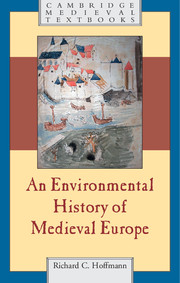Book contents
- Frontmatter
- Contents
- List of figures
- List of maps
- Preface
- Frontispiece: Nature and culture at Waterford, Ireland, 1372
- Introduction: Thinking about medieval Europeans in their natural world
- 1 Long no wilderness
- 2 Intersecting instabilities: culture and nature at medieval beginnings, c.400–900
- 3 Humankind and God’s Creation in medieval minds
- 4 Medieval land use and the formation of traditional European landscapes
- 5 Medieval use, management, and sustainability of local ecosystems, 1: primary biological production sectors
- 6 Medieval Use, management, and sustainability of local ecosystems, 2: interactions with the non-living environment
- 7 ‘This belongs to me . . .’
- 8 Suffering the uncomprehended: disease as a natural agent
- 9 An inconstant planet, seen and unseen, under foot and overhead
- 10 A slow end of medieval environmental relations
- Afterword
- A sampler for further reading
- Index
- References
3 - Humankind and God’s Creation in medieval minds
Published online by Cambridge University Press: 05 July 2014
- Frontmatter
- Contents
- List of figures
- List of maps
- Preface
- Frontispiece: Nature and culture at Waterford, Ireland, 1372
- Introduction: Thinking about medieval Europeans in their natural world
- 1 Long no wilderness
- 2 Intersecting instabilities: culture and nature at medieval beginnings, c.400–900
- 3 Humankind and God’s Creation in medieval minds
- 4 Medieval land use and the formation of traditional European landscapes
- 5 Medieval use, management, and sustainability of local ecosystems, 1: primary biological production sectors
- 6 Medieval Use, management, and sustainability of local ecosystems, 2: interactions with the non-living environment
- 7 ‘This belongs to me . . .’
- 8 Suffering the uncomprehended: disease as a natural agent
- 9 An inconstant planet, seen and unseen, under foot and overhead
- 10 A slow end of medieval environmental relations
- Afterword
- A sampler for further reading
- Index
- References
Summary
The immediate material discontinuities late antiquity brought to Europe’s environmental relations were matched by cultural transformation. In diverse ways, including some that have no connection to what this book explores, classical Mediterranean civilization broke up and vanished, leaving behind only cultural relicts to influence its successors in Byzantium, Islam, and medieval western Christendom. Indeed, while by the eighth century this last was defining itself as Christian and ‘Roman’, what members of this culture meant thereby referred as much to use of the Latin language and Latin letters by the literate elite as it did to the general respect, but not authority, they acknowledged to the bishop of Rome, the Pope, as successor of Peter and Vicar of Christ. Westerners shared certain seminal assumptions about the nature of culture, the place of humankind, and the quality of human connections to other things. Some of their assumptions were of Christian origin, others were much older and deeper but now most commonly expressed in Christian terms. Matters metaphysical have little relevance here; ontology and philosophical essentialism are not to be conflated with examining how medieval cultures interacted with the world of natural causality. This chapter seeks to establish how medieval people thought about their relationship to God’s Creation as they understood it, and notably how their evident thinking meshed with their experience and activities in the material sphere. In terms already introduced, a primarily emic probe into medieval minds is thus glossed with etic views of medieval behaviour.
It is important to recognize that the European Middle Ages lacked self-conscious or even coherent tacit discourse on relations of humans to nature or on nature as an entity, to say nothing of such concepts as environment or ecology, both of which are modern, not medieval, ideas. As in classical antiquity, to look for them as such in medieval Europe is to risk wishful self-deception.
- Type
- Chapter
- Information
- An Environmental History of Medieval Europe , pp. 85 - 112Publisher: Cambridge University PressPrint publication year: 2014

